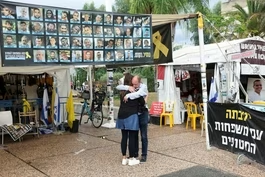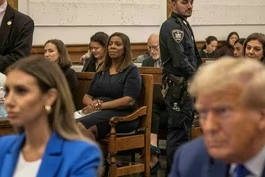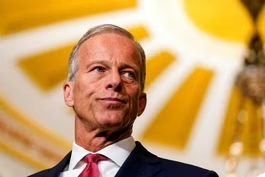
Mideast expert analyzes Gaza peace deal and what comes next
Clip: 10/9/2025 | 6m 50sVideo has Closed Captions
Mideast expert analyzes Gaza peace deal and what comes next for the region
For another perspective on the Israel and Hamas peace deal, Amna Nawaz spoke with Mouin Rabbani. He is a former United Nations official and non-resident senior fellow at the Middle East Council on Global Affairs. He’s also co-editor of Jadaliyya, an online publication that focuses on the Middle East.
Problems playing video? | Closed Captioning Feedback
Problems playing video? | Closed Captioning Feedback
Major corporate funding for the PBS News Hour is provided by BDO, BNSF, Consumer Cellular, American Cruise Lines, and Raymond James. Funding for the PBS NewsHour Weekend is provided by...

Mideast expert analyzes Gaza peace deal and what comes next
Clip: 10/9/2025 | 6m 50sVideo has Closed Captions
For another perspective on the Israel and Hamas peace deal, Amna Nawaz spoke with Mouin Rabbani. He is a former United Nations official and non-resident senior fellow at the Middle East Council on Global Affairs. He’s also co-editor of Jadaliyya, an online publication that focuses on the Middle East.
Problems playing video? | Closed Captioning Feedback
How to Watch PBS News Hour
PBS News Hour is available to stream on pbs.org and the free PBS App, available on iPhone, Apple TV, Android TV, Android smartphones, Amazon Fire TV, Amazon Fire Tablet, Roku, Samsung Smart TV, and Vizio.
Providing Support for PBS.org
Learn Moreabout PBS online sponsorshipAMNA NAWAZ: For a different perspective now, we turn to Mouin Rabbani.
He's a former United Nations official and non-resident senior fellow at the Middle East Council on Global Affairs.
He's also co-editor of Jadaliyya.
And that's an online publication that focuses on the Middle East.
And welcome to the "News Hour," Mouin.
I want to begin by asking you just about what we heard from the Israeli ambassador there, saying it was the combination of pressure from Arab countries on Hamas leadership and the Israeli military pressure on Hamas in Gaza, that that's what got Hamas to the table and to sign off on this deal.
Do you agree with that?
MOUIN RABBANI, Senior Fellow, Middle East Council on Global Affairs: Yes, it's a fantastic distortion of events.
What actually happened is that this is an agreement that Israel and specifically Israeli Prime Minister Benjamin Netanyahu did not want.
But what happened is that the United States took the decision that this agreement was going to be reached and implemented.
And it took no more than a single phone call from Trump to Netanyahu, and the deal was done.
Of course, there was military pressure in the Gaza Strip in the form of genocide.
And there was pressure from Arab and Muslim leaders on Hamas.
And this led them to make some concessions they rather would not.
But Israel has consistently rejected an agreement now for two years.
And, as we saw already in January and again now, a simple message from the United States to Israel is all it takes to make things happen.
AMNA NAWAZ: Well, from the Hamas perspective here, though, they have previously wanted guarantees that Israel would not renew the war before it returned hostages, right, that that was a condition for them.
They don't have that guarantee here.
MOUIN RABBANI: Yes.
AMNA NAWAZ: And they're still agreeing to return hostages.
So what changed for Hamas?
MOUIN RABBANI: Well, the agreement stipulates that there's not only a cease-fire, but an end to the war.
And President Trump has announced that on multiple occasions.
That's the most they're going to get in terms of a guarantee.
I mean, one can't take any commitment made by President Trump or the Israelis seriously.
But in terms of guarantees, that's the best that is available.
I mean, concretely, there really isn't more that could have been offered that would have satisfied Hamas or the Palestinians, the Palestinians in the Gaza Strip who've been subjected to this genocidal military campaign for two full years now.
AMNA NAWAZ: This does seem to say, if I'm hearing you correctly, that they're putting some faith and trust in President Trump, in his ability to have some kind of influence over Israel, to not restart the war here.
What is that faith and trust based on then in President Trump?
MOUIN RABBANI: Well, I think it's misplaced.
I mean, ultimately, this agreement will be implemented and this agreement will continue to be implemented if the United States decides it's in its interest to continue doing so.
What we saw in January, there was an agreement and it later emerged that the Trump's primary interest was ensuring that he had a diplomatic achievement on the day of his inauguration and that, once that passed, he lost interest.
And in February, the U.S.
basically authorized Israel to abrogate the agreement and to renew the genocide.
That may well happen now, because a deadline for this agreement was tomorrow, because that's when the Nobel Peace Prize is going to be announced.
Now that Trump is actually going to the region and is going to bask in the glory of this agreement, is that going to motivate him to ensure that it continues?
Or, to the contrary, will he allow Israel to -- as it has done in the past, to find ways to elude its commitments and to find a way either not to implement things or to resume its full-scale campaign?
Those are unanswered questions.
And Hamas wasn't going, the Palestinians, for that matter, weren't going to get better than what's on offer in that respect.
AMNA NAWAZ: Among the other long-term questions, of course, are some of the issues we have heard the Israeli ambassador raise about whether or not Hamas will demilitarize and what that future governance will look like.
We should just remind folks, Hamas saw its leader in Gaza, Yahya Sinwar, killed during the war.
That followed the killing of its exiled political leader, Ismail Haniyeh, in Iran earlier that year.
What is the Hamas version of their future in Gaza?
What does future governance look like to them?
MOUIN RABBANI: Well, I think the key issue is the Palestinian future, rather than the Hamas future.
Having said that, the proposal that was announced by Trump and Netanyahu at the White House last week dealt with three sets of issues, the immediate issues, exchange of captives, cease-fire, Israeli withdrawal and so on.
And that has now been negotiated and agreed.
A second set of issues regarding particularly governance in the Gaza Strip and the future of Hamas' weapons has neither been addressed nor negotiated.
And then there's a third set of issues which concerns the broader political issues, which was only tangentially addressed in the proposal.
And that's not really on the agenda at all.
As far as governance is concerned, Hamas long ago accepted that it would not be part of any governing structure in the Gaza Strip after the end of the genocide.
What has happened is, is that the proposal, without consulting any Palestinians, basically formulated this colonial viceroy, Tony Blair, to rule the Gaza Strip essentially on behalf of Israel more than on behalf of the Palestinians.
That is now dead in the water, because it also makes it extremely complicated for Arab and Muslim states to directly participate in funding reconstruction and in sending a potential stabilization force.
As far as disarmament is concerned, Hamas leaders today made very clear that decommissioning is something they're prepared to negotiate, but disarmament is not something that they're prepared to do this side of Palestinian freedom.
AMNA NAWAZ: That is Mouin Rabbani from the Middle East Council on Global Affairs joining us tonight.
Thank you so much for your time.
MOUIN RABBANI: Thank you.
Collection of Virginia Woolf's lost stories published
Video has Closed Captions
Clip: 10/9/2025 | 5m 37s | Collection of Virginia Woolf's lost stories published nearly 80 years after her death (5m 37s)
Gazans and Israelis celebrate ceasefire deal
Video has Closed Captions
Clip: 10/9/2025 | 7m 36s | Gazans and Israelis celebrate ceasefire deal with hopes for lasting peace (7m 36s)
ICE escalates aggressive raids in Chicago
Video has Closed Captions
Clip: 10/9/2025 | 7m 25s | ICE escalates aggressive raids in Chicago as Trump moves to deploy National Guard (7m 25s)
Leiter: 'Hamas cannot remain' in Gaza for this plan to work
Video has Closed Captions
Clip: 10/9/2025 | 7m 48s | 'Hamas cannot remain' in Gaza for this plan to work, Israeli ambassador to U.S. says (7m 48s)
Letitia James indicted after pressure from Trump
Video has Closed Captions
Clip: 10/9/2025 | 3m 19s | N.Y. Attorney General Letitia James indicted on fraud charge after pressure from Trump (3m 19s)
News Wrap: Colombian president accuses U.S. of aggression
Video has Closed Captions
Clip: 10/9/2025 | 3m 29s | News Wrap: Colombian president accuses U.S. of 'military aggression' in Caribbean (3m 29s)
Thune says vote on subsidies possible after government opens
Video has Closed Captions
Clip: 10/9/2025 | 9m 51s | Thune says vote on health care subsidies possible, but only after government reopens (9m 51s)
Providing Support for PBS.org
Learn Moreabout PBS online sponsorship
- News and Public Affairs

FRONTLINE is investigative journalism that questions, explains and changes our world.

- News and Public Affairs

Amanpour and Company features conversations with leaders and decision makers.












Support for PBS provided by:
Major corporate funding for the PBS News Hour is provided by BDO, BNSF, Consumer Cellular, American Cruise Lines, and Raymond James. Funding for the PBS NewsHour Weekend is provided by...






